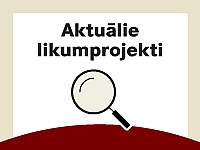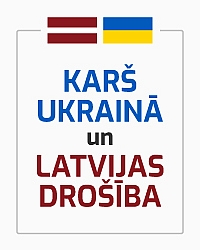 Galerija
Galerija
“Introduction of the euro in Latvia proceeded like clockwork, and now we must prepare for managing equally successfully Latvia’s first presidency of the Council of the European Union by involving society, including the Latvian diaspora. This is a step forward in keeping the public’s attention focused on topical EU issues even after the presidency,” stressed Zanda Kalniņa-Lukaševica, Chairperson of the European Affairs Committee of the Saeima. On Friday, 10 January, the Committee met with EU affairs experts to discuss the accomplishments and planned future activities regarding foreign policy and EU issues before the Saeima’s annual foreign policy debate.
Kalniņa-Lukaševica also expressed gratification for the agreement on the preparation and implementation of Latvia’s presidency of the Council of the European Union in the first half of 2015 that was signed at the end of last year by the political parties represented in the 11th Saeima. Latvia’s presidency will be an event of national significance, one that not only will involve the competence of the government but also will be a cooperative process between the legislative and the executive power.
Žaneta Ozoliņa, Professor in the Department of Political Science of the Faculty of Social Sciences of the University of Latvia, emphasised that 2014 will be a hectic year for foreign and European policy. She added that Europe as a whole and Latvia, including its presidency, will be influenced by a number of events in domestic and foreign policy, such as the looming European Parliament elections and a change in the political leadership of the EU. These events will provide the political and ideological background for Latvia’s presidency and its agenda, noted Ozoliņa.
In the context of the presidency, Ozoliņa also affirmed that one has to remember that Latvia will assume the duties of the presiding country for the very first time and that Latvia’s image in Europe will depend on our conduct of the presidency.
Edijs Bošs, Docent at the Faculty of European Studies of Rīga Stradiņš University, regarding the upcoming elections of the 12th Saeima, said that this year both the EU and Latvia will face major changes; therefore, Latvia’s presidency of the Council of the EU in the first six months of 2015 will be challenging and possibly full of surprises. In commenting on discussions that have already taken place regarding the presidency, Bošs stressed that it offers an opportunity to accumulate vast institutional memory and to develop the civil service; however, it is also possible that by overstating the importance of the presidency to the public, policy makers can create the opposite effect.
Atis Lejiņš, Deputy Chairman of the European Affairs Committee, said that the changes in the EU after the European Parliament elections “will give Latvia an outstanding chance to show that it can shine like a lighthouse in a stormy sea”. Lejiņš mentioned that if the current convocation of the European Parliament is unable to settle the Banking Union issue, that will probably be one of the items on the agenda during Latvia’s presidency of the Council of the EU.
Aldis Austers, Chairman of the European Latvian Association, expressed his gratification that the annual report of the Foreign Minister on the performance and planned future activities in foreign policy and European Union issues contains a commitment to address the issue of the diaspora during Latvia’s presidency. Austers said that migration is topical not only in Latvia but also in other EU member states and that we can expect the competition for human resources to become even stiffer.
Andris Gobiņš, President of the European Movement – Latvia, said that in the context of Latvia’s presidency, involvement of the public is still vital because it is one of Latvia’s horizontal priorities.
Members of the Committee and EU affairs experts concluded in the meeting that the Eastern Partnership is another substantial European challenge that Latvia will face in the near future. MP Ojārs Ēriks Kalniņš (Unity) emphasised that the goal is to make the Eastern Partnership countries change their political culture, and although the EU member states have common values, it must be understood that currently we are living in a multipolar value system.
According to the Rules of Procedure of the Saeima, not later than by 16 January, the Minister for Foreign Affairs has to submit to the Saeima the annual report, approved by the Prime Minister, on the performance and planned future activities in foreign policy. This report should also contain information on accomplished and planned activities regarding European Union issues.
The Saeima’s annual foreign policy debate will be held for the fourth time.
The foreign policy debate is held at the plenary sitting that is closest to the date of international recognition of the Republic of Latvia (26 January).
Annual report of the Foreign Minister on the performance and planned future activities in foreign policy and European Union issues (in Latvian)
Photos from the meeting are available at: https://www.flickr.com/photos/saeima/sets/72157639612498523/
Rules for using the content: https://www.saeima.lv/en/copyrights









